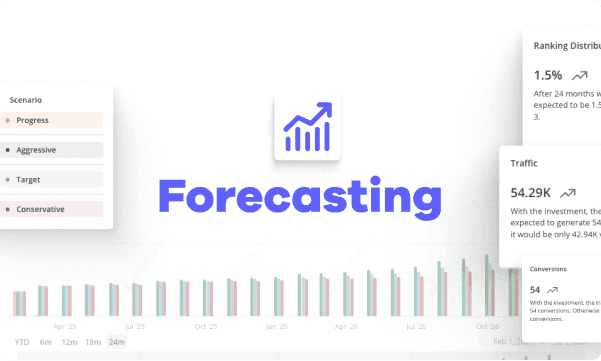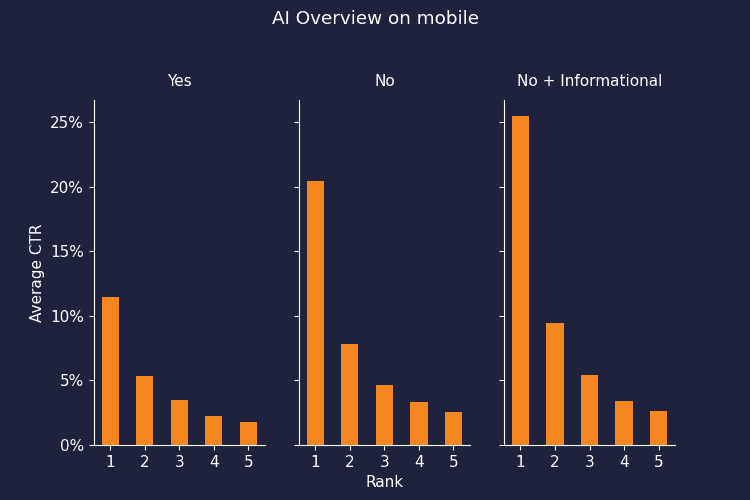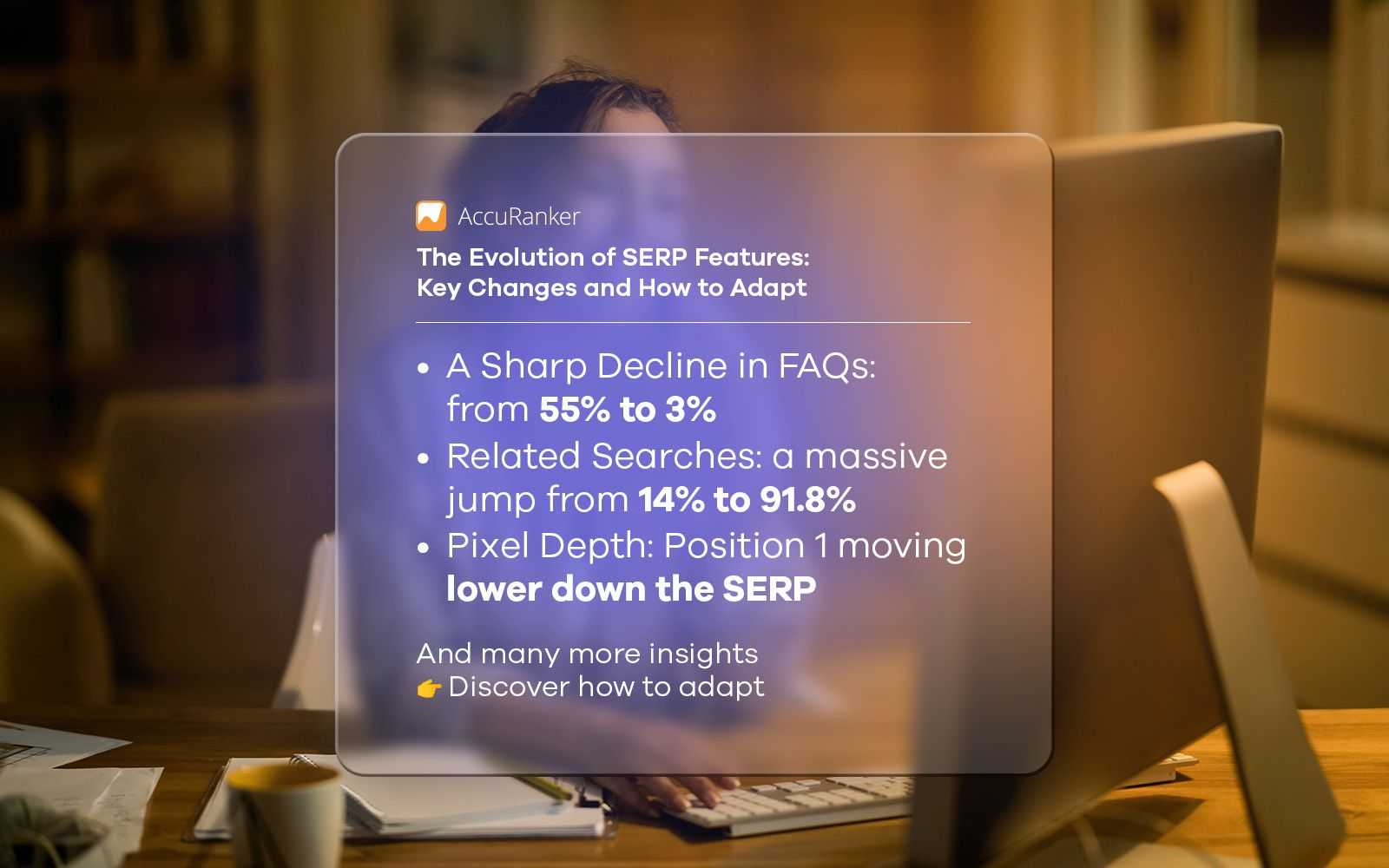The Future of B2B Lead Generation: Emerging Trends and Technologies
Last updated on Monday, October 16, 2023

B2B lead generation includes identifying, finding, and nurturing potential customers to turn them into raving fans. Businesses need to leverage, practice, and implement emerging B2B lead generation trends and technologies to scale businesses and stay ahead of the competition.
If you are an expert, you must already be familiar with the emerging trends of B2B lead generation and what the future of B2B lead generation will look like. This article will help you with an in-depth understanding of how the current state of B2B lead generation has evolved providing better efficiency and effectiveness throughout the sales processes.
We will also discuss how B2B marketers can leverage data to improve the lead-generation process and its significance for business growth.
Let’s get started!
Current State of B2B Lead Generation
Traditional B2B lead generation methods include cold calling, email marketing, and direct mail. While these methods are still effective in generating leads, in recent years B2B lead generation has improved a lot due to excessive data accessibility. However, it is also associated with several challenges like analyzing and managing large sets of data.
Data-driven approach and its role in lead generation
Data is the future of the modern world. Studies show that 328.77 million terabytes are generated every single day. While there is a plethora of data available in the market, making major business decisions based on the right sets of data is challenging in B2B lead generation.
B2B marketers can leverage data in the right way to uncover significant insights to improve the overall lead generation strategy. This helps find engaged leads, enhance sales efforts, and ensure better ROI. Data enables you to ensure personalization for better user experience, better engagement rates, and higher conversion rates.
Challenges Faced by B2B Marketers
Businesses face several challenges in the current B2B lead generation landscape.
One of the biggest challenges is identifying the right target audience. With so much data available in the market, it can be difficult to determine which leads are most likely to convert into customers.
Another challenge is managing and analyzing data effectively. It is essential to have the right tools for data collection, management, organization, and analysis in B2B lead generation.
Emerging Trends in B2B Lead Generation
Let’s look into the emerging trends in B2B lead generation.
#1. Account-Based Marketing (ABM) and its impact on lead targeting
ABM is the new normal for B2B brands, and it is becoming increasingly important for B2B lead generation. It allows businesses to hyper-target their accounts, personalize their messaging, and integrate their sales and marketing efforts to improve their lead targeting and generate more revenue.
ABM thrives on sales and marketing collaboration, crafting personalized buying experiences for high-value accounts. This synergy enables deep understanding, resonating messaging, and seamless sales progression through ABM automation.
For example, LinkedIn sets the ABM benchmark with precise targeting via seniority and job title. It is the key factor to engage decision-makers.
#2. AI-Powered Lead Scoring and Predictive Analytics
Lead scoring is a very time-consuming process if performed manually. As Hubspot states, 79% of B2B companies do not have any proven strategy for their lead scoring. Recently, businesses have leveraged AI to efficiently analyze and predict the buying intention of their target audience.
AI-powered lead scoring uses data from various sources like website activity and social media engagement, employing machine learning to accurately evaluate lead quality based on behavior and demographics. This helps to focus on high-value leads for better conversion rates, leveraging AI to identify conversion patterns and optimize sales strategies.
#3. Content Marketing and Thought Leadership
Valuable content builds trust and credibility. 83% of B2B marketers suggest businesses should focus on creating quality content that’s customer-centric and value-driven. Therefore, content marketing and thought leadership are crucial in B2B lead generation.
Thought leadership distinguishes the brand and attracts promising leads. Showcase your business as a thought leader with a proven content strategy. In your content plan include blogs, whitepapers, guides, user manuals, and videos that establish your brand as an industry authority. Launch campaigns and run ads on platforms like Google and LinkedIn to target the right audience for better reach and an efficient lead-generation process.
#4. Chatbots and Conversational Marketing
Conversational marketing employs chatbots for natural prospect interactions, guiding them through the funnel. These AI-powered tools mimic human conversations, ensuring real-time engagement and lead qualification, even beyond regular business hours.
Studies show that nearly 84% of B2B businesses incorporate chatbots for engaging leads. This approach also enhances customer experiences, humanizing the journey, and automating interactions for streamlined marketing and strengthened relationships.
#5. Social Selling and Influencer Engagement
To boost leads and connections, businesses can leverage social platforms in several ways including;
Engage in social selling on platforms like LinkedIn, Facebook, Twitter, and Instagram combining content and active outreach.
Reach out to relevant influencers for dynamic brand promotion.
Prioritize aligned values and engaged followers over sheer numbers—leverage influencer reviews for credibility, offering samples for feedback.
Connect with industry experts for positive word-of-mouth.
Collaborate with micro-influencers for authenticity and audience connections.
Technological Advancements in B2B Lead Generation
#1. Big Data and Analytics
Leveraging data-driven insights can reshape lead generation, optimizing targeting and conversion strategies. It helps marketers to dive into audience behavior analysis, pinpoint ideal prospects, fine-tune lead scoring, and personalize nurturing.
B2B marketers can expand the impact of data by refining targeting and retargeting, building comprehensive databases, optimizing conversion rates, and forging stronger marketing-sales collaboration. With data analytics, the digital landscape becomes smooth with actionable data-driven strategies for unparalleled precision and success.
#2. Machine Learning and Automation
Marketers can seamlessly improve lead generation by leveraging machine learning and automation. The whole idea of machine learning is about improving efficiency and precision.
For example, you can automate lead scoring for accurate qualification and personalized email outreach. Employ automated chatbots to engage leads while focusing sales efforts. Furthermore, algorithm analysis identifies promising leads and tailors content, ultimately improving conversions through data-driven insights.
#3. CRM and Marketing Automation Platforms
Blend CRM and marketing automation for streamlined lead management. It helps to personalize messages, prioritize leads through scoring, and unify efforts.
Sync platforms like HubSpot, Salesforce, and Marketo to guide prospects and harmonize teams. This integration improves efficiency, saving time and elevating your business ROI.
The Role of Big Data in B2B Lead Generation
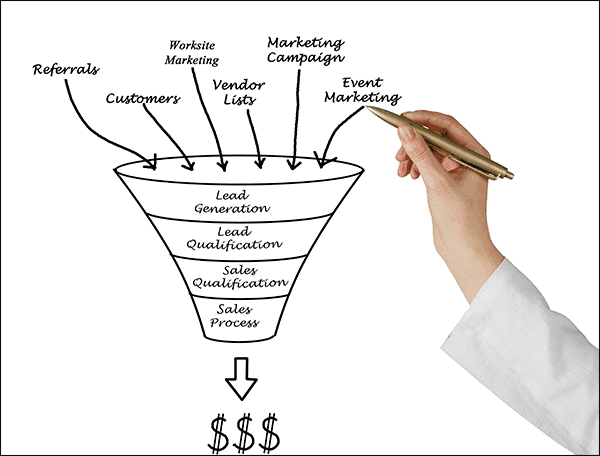
Big data plays a crucial role in B2B lead generation, providing insights that can help improve lead segmentation and targeting. Analyzing substantial data sets empowers businesses to better comprehend their ideal customers, resulting in the creation of impactful marketing campaigns.
Here is how you can put big data into action for lead insights:
Align Sales and Marketing
Big data can help align sales and marketing efforts by providing insights into customer behavior and preferences.
Insight Into Buying Habits
By analyzing customer data, businesses can gain insights into buying habits and preferences, allowing them to create more targeted marketing campaigns.
Optimize Campaigns
Big data can be used to optimize marketing campaigns by identifying which channels and tactics are most effective.
Evaluate Leads
Large sets of data help businesses evaluate leads and prioritize those that are most likely to convert.
The Impact of Automation on B2B Lead Generation
B2B has evolved due to automation. It enables teams to improve productivity and ensure scalability using various tools and software.
Automating lead scoring and nurturing processes
Marketing automation in B2B lead generation helps to segment potential customers. Then, it kicks into gear with automated methods to nurture these leads until they turn into buyers.
This includes automating email campaigns, follow-ups, and even outbound calls scripts based on lead behavior and engagement.
Based on your target customer persona you can identify leads, and build a strong pipeline to qualify leads
Streamline the lead generation effectively
Ensure lead qualification and scoring leads worth pursuing
Segment cold leads timely to save time and efforts
Increasing efficiency and reducing manual workload
The risk of human error is inevitable. Marketing automation helps businesses to reduce it by handling data more accurately and consistently. It also enables sales teams to work on major business decisions to generate more revenue while reducing the time spent on manual tasks like;
Follow-ups
Lead scoring
Email campaigns
Data analysis etc.
Potential risks and ensuring human touch in lead generation
Using machines is great for marketing automation. If you rely too much on machines, you might lose the personal touch. That means you might need to connect with customers better. This could hurt your business. To avoid this problem, make sure people are still involved in the process, even when machines are used.
For example, you can write personalized emails and messages for the hot leads that are in the final stage of the sales funnel just before they are ready to take action or make a purchase. At this stage encourage your sales team to talk to customers one-on-one when needed.
Integrating Social Media in B2B Lead Generation
Role of Social Media in the B2B Sales Funnel
Social media plays an important role in the B2B sales funnel. According to Hubspot, social media helps businesses to achieve 40% of sales. 95% of the customers choose to buy from a brand that promotes relevant, personalized, and customer-focused content via social media.
While social media content is great for brand awareness and customer engagement, marketers use social media data or social data to strengthen the B2B sales funnel in the following ways:
Lead segmentation
Lead enrichment
Lead scoring
Lead nurturing
Lead attribution
Best Practices for B2B Lead Generation on Different Social Platforms
Facebook and LinkedIn
Both platforms offer integrated lead forms for convenient lead collection. Businesses can simplify the process and enhance potential customer engagement.
For example, LinkedIn Ads allows you to capture leads instantly that you can send to CRM for follow-ups. Similarly, you can get all the information of your potential lead through a pre-populated form when they request to join your business Facebook group.
Check out this lead generation form by Paycom!
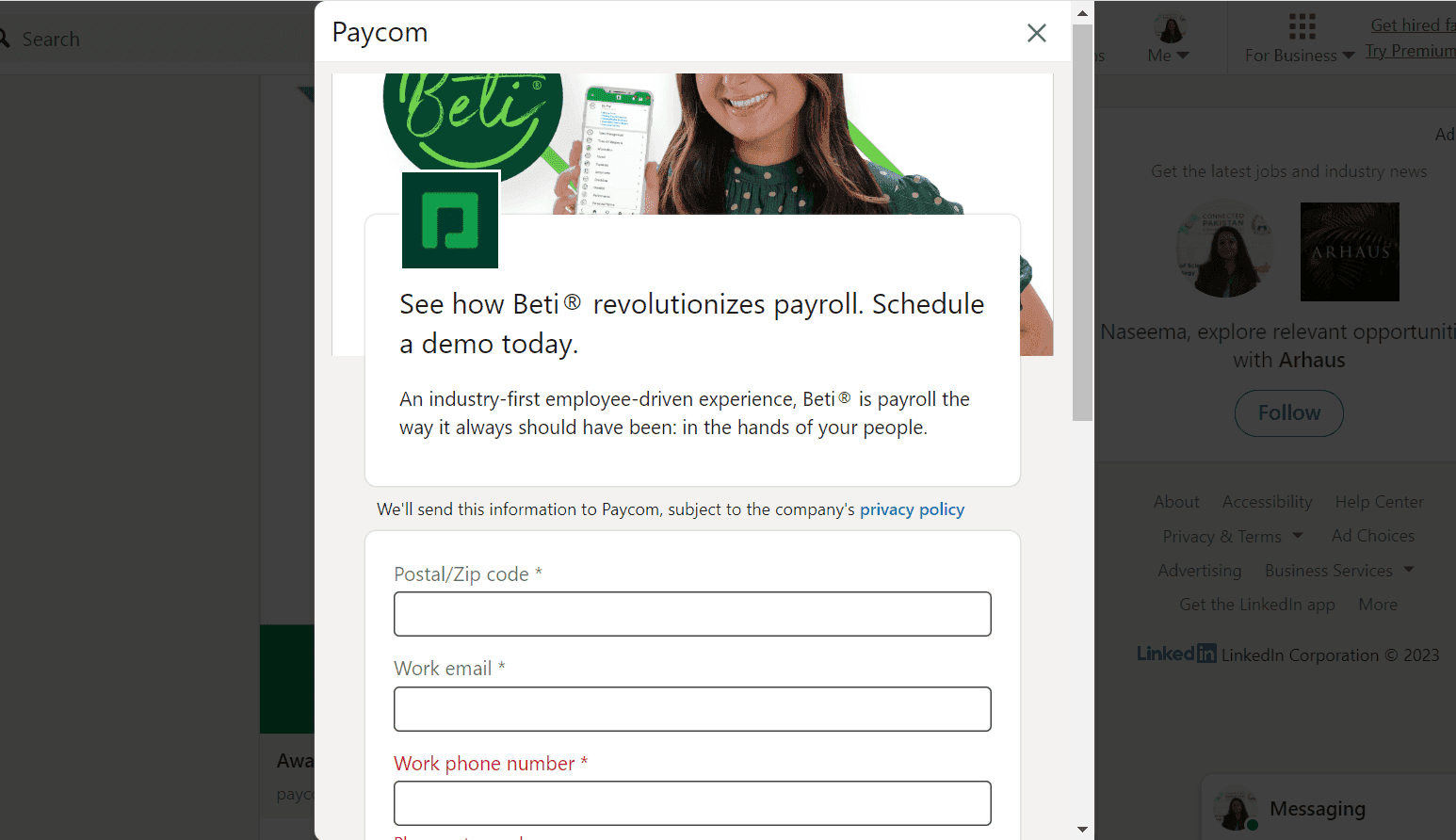
Utilize Instagram to amplify brand visibility and spark interest in products/services. Instagram is a visual platform, show off your best visual content to nurture leads. You can leverage influencer marketing to make the most of Instagram particularly if have a fashion, or lifestyle business.
X (Formerly Twitter)
Engage with prospects on X, sharing valuable insights about offerings. Promoting educational content and active participation in industry discussions foster trust and establish industry leadership.
YouTube
Leverage YouTube to offer comprehensive insights into products/services. Creating educational videos and sharing them establishes expertise and draws potential customers.Also, don’t forget to create a YouTube channel trailer. It will make your channel look more presentable.
Social Listening for Prospect Insights
Discover the art of social listening – a process that uncovers customer preferences and behaviors. Tailor your approach using these steps:
Strategic Monitoring
Pick keywords and topics aligned with your business to monitor trends effectively.
Address Pain Points
Identify industry gaps and audience concerns to craft targeted content.
Engage Actively
Connect with prospects through competitor research and engaging comments.
Refine Feedback
Analyze conversations to refine products and meet customer needs.
The Future of B2B Lead Generation: Human vs. Machine
We are already experiencing the changes. There is an ongoing debate about whether or not AI & ML is here for good. But as a lead analyst, you might agree that machines are helpful.
Balancing human Expertise and AI Capabilities
Future B2B lead gen combines AI and human expertise. AI automates tasks like lead scoring, freeing teams for strategic work. Yet, human skills excel in nuanced decisions and relationship building.
Role of sales and marketing teams in the future landscape
Sales and marketing stay vital in B2B lead gen. AI aids in data analysis and scoring, but the human touch remains crucial for relationship-building and closing deals. Teams adapt to tech while retaining core roles.
Navigating ethical considerations in AI-powered lead generation
As AI grows in B2B lead gen, ethics matter. AI might unintentionally reinforce biases or discriminate. To address this, AI systems must be transparent, and audited for fairness, and customer data use must be clear with opt-out options.
Conclusion
Lead generation is a crucial aspect of B2B marketing. Businesses need to leverage emerging trends, technologies, and tools to ensure effective and efficient lead generation for a better ROI.
A customer-centric approach always ensures a win-win situation when it comes to B2B lead generation. It is important to harness emerging strategies including account-based marketing, hyper-personalization, AI, and data-driven approaches to ensure better business results.

Article by:
Nayana Bhasurasen
SEO Tech Lead and Outreach Manager at Visme
Nayana is a passionate Digital Marketer who specializes in SEO, Email Marketing, Social Media Outreach and Community Relationship Management. She is currently the SEO Tech Lead and Outreach Manager at Visme.
